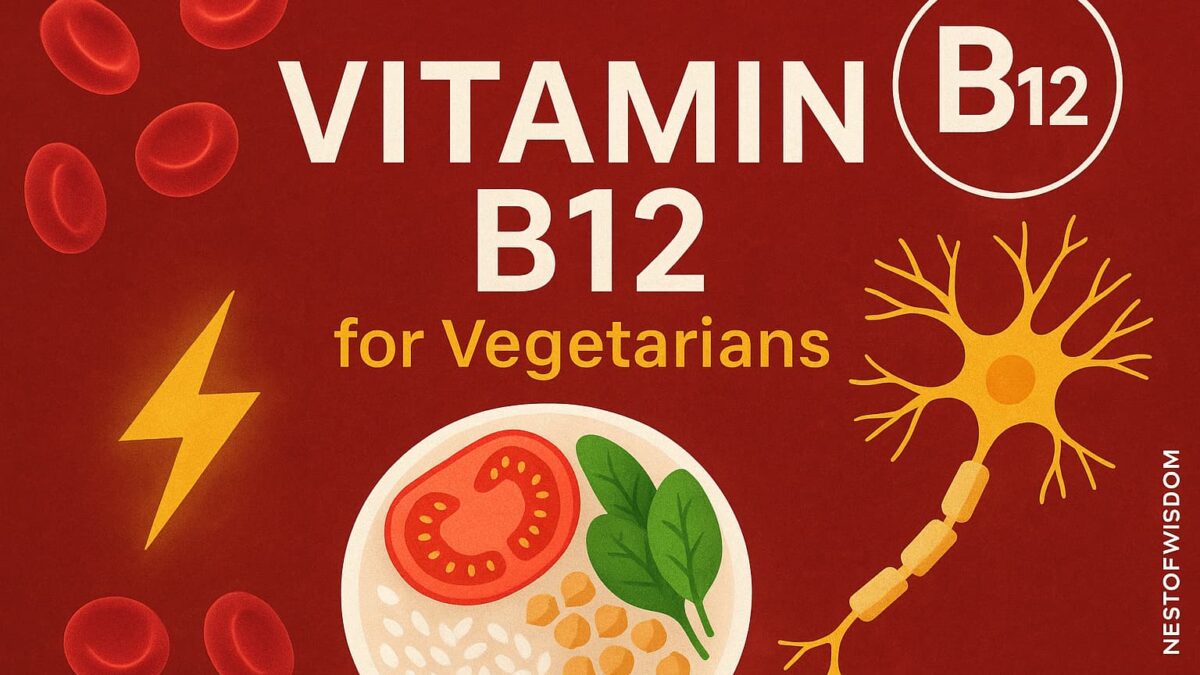Vitamin B12 Deficiency in Vegetarians is one of the most under-recognized nutrition gaps across Indian and global households where plant-based diets are common. Vitamin B12 powers red blood cell formation, nerve insulation (myelin), DNA synthesis, and energy metabolism. When intake or absorption is low, issues start quietly—fatigue, brain fog, low mood—and can progress to numbness, balance trouble, and memory problems. The good news? With a practical plan that blends fortified foods, smart supplementation, gut-friendly habits, and traditional wisdom, most people can correct Vitamin B12 Deficiency in Vegetarians and protect long-term health.
Table of Contents
- What Is Vitamin B12 & Why It Matters
- Forms of B12 (Cobalamin) & Which One to Choose
- Why Vegetarians Are at Higher Risk
- Hidden Risk Factors That Worsen Deficiency
- Symptoms: Early vs Later Signs
- Busted Myths about Vegetarian B12
- How to Test Correctly (B12, MMA, Homocysteine)
- Natural Ways to Fix Vitamin B12 Deficiency in Vegetarians
- 1-Day B12-Smart Vegetarian Meal Plan
- Real-Life Case Study (Vegetarian Adult)
- What Happens if Deficiency Is Ignored?
- Lifestyle & Prevention Tips
- FAQs
- Helpful Internal & External Links
✨ What Is Vitamin B12 & Why It Matters
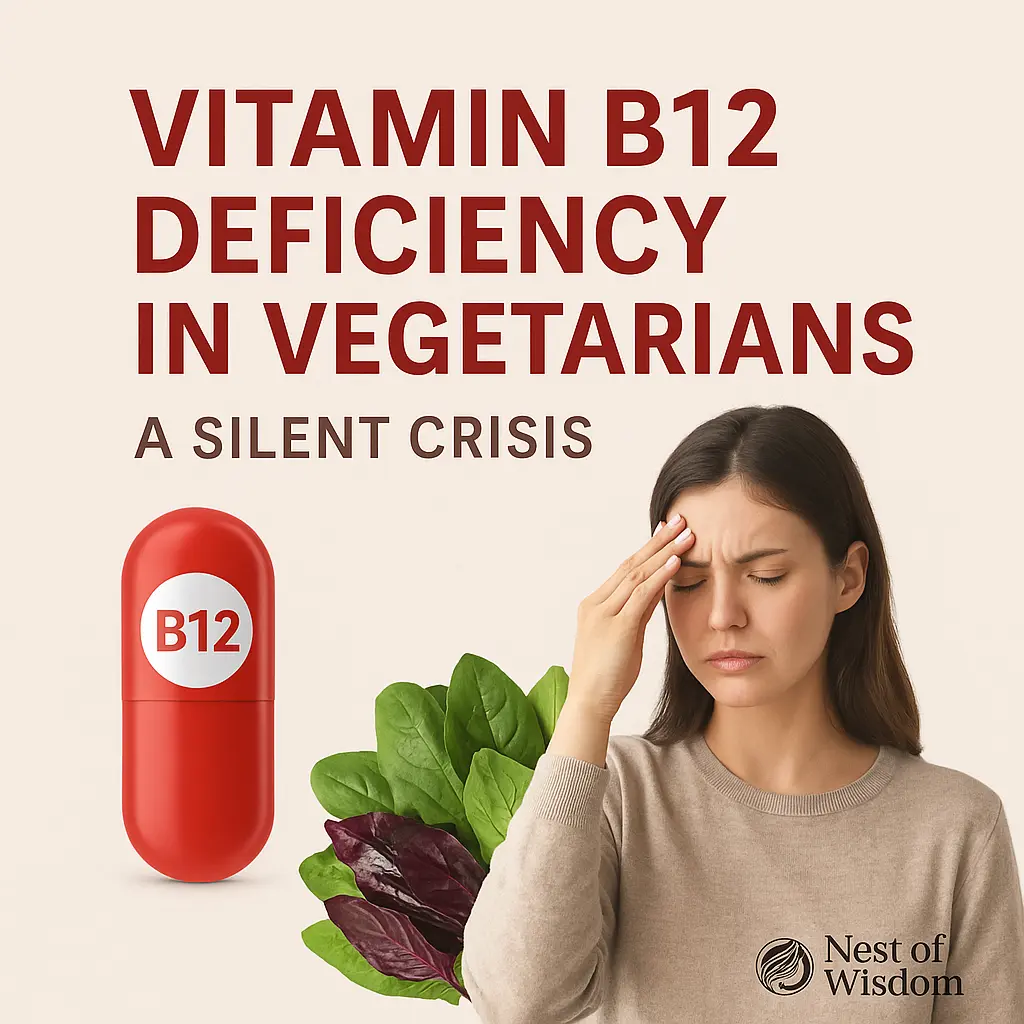

Vitamin B12 (cobalamin) is a water-soluble vitamin crucial for:
- DNA synthesis and cell division
- Red blood cell formation (prevents megaloblastic anemia)
- Nerve insulation and brain function (myelin maintenance)
- Cellular energy production and mental clarity
Your body can’t make B12 and stores are limited—so steady intake and good absorption are essential. That’s why Vitamin B12 Deficiency in Vegetarians can develop silently if diet and absorption aren’t planned well.
🔬 Forms of B12 (Cobalamin) & Which One to Choose
Cobalamin exists in several forms. The two most common in supplements for addressing Vitamin B12 Deficiency in Vegetarians are:
- Cyanocobalamin: Highly stable, widely used, cost-effective; converts to active forms in the body.
- Methylcobalamin: Biologically active form; popular in sublingual tablets or sprays.
What to pick? For most adults with Vitamin B12 Deficiency in Vegetarians, either form works if the dose and adherence are right. Your clinician may prefer cyanocobalamin for stability, or methylcobalamin if you respond better to it. Severe malabsorption may need injections initially.
🛑 Why Vegetarians Are at Higher Risk
Most naturally rich B12 sources are animal-derived:
- Organ meats (liver), meat, poultry
- Fish and shellfish
- Eggs and dairy (dairy contains smaller amounts)
Plant foods do not naturally contain active, absorbable B12. That’s why Vitamin B12 Deficiency in Vegetarians is common unless you use fortified foods and/or supplements. Regions with low fortification or limited product availability face a bigger gap.
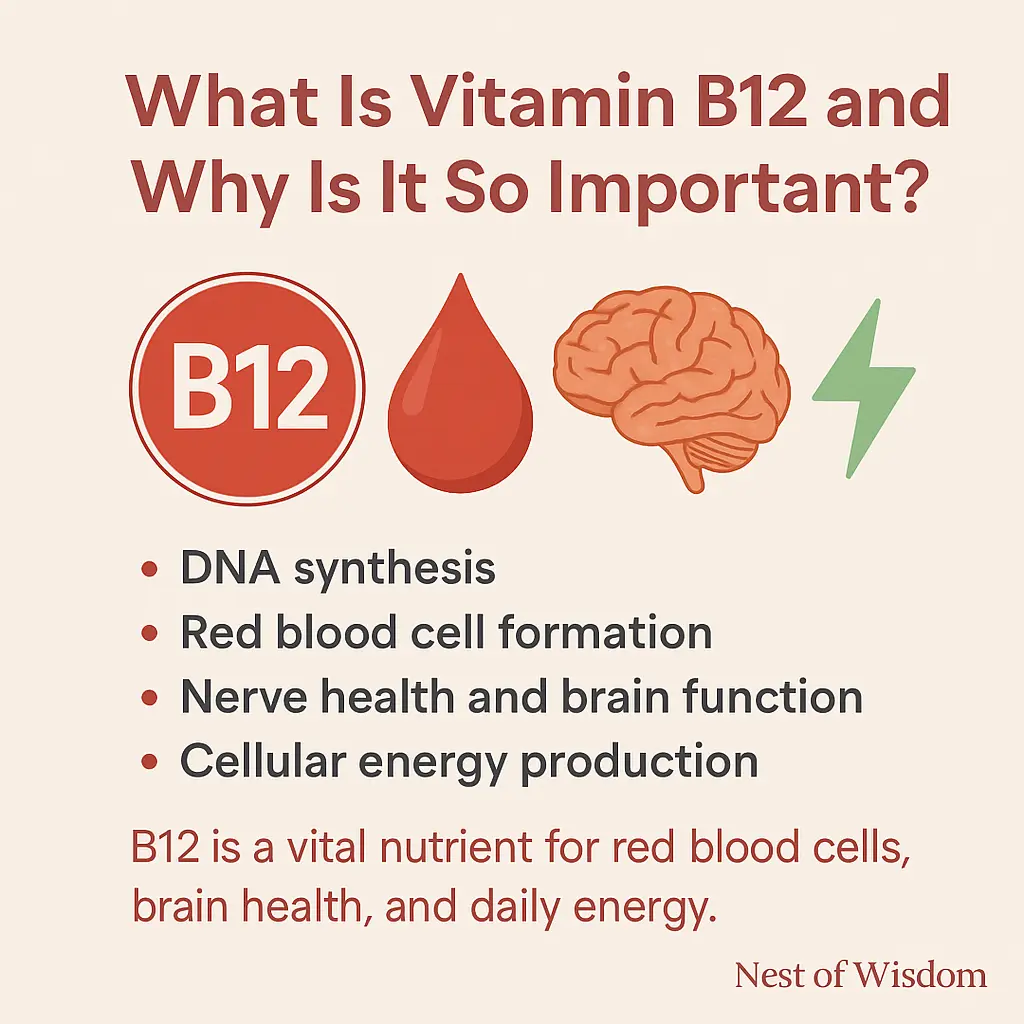

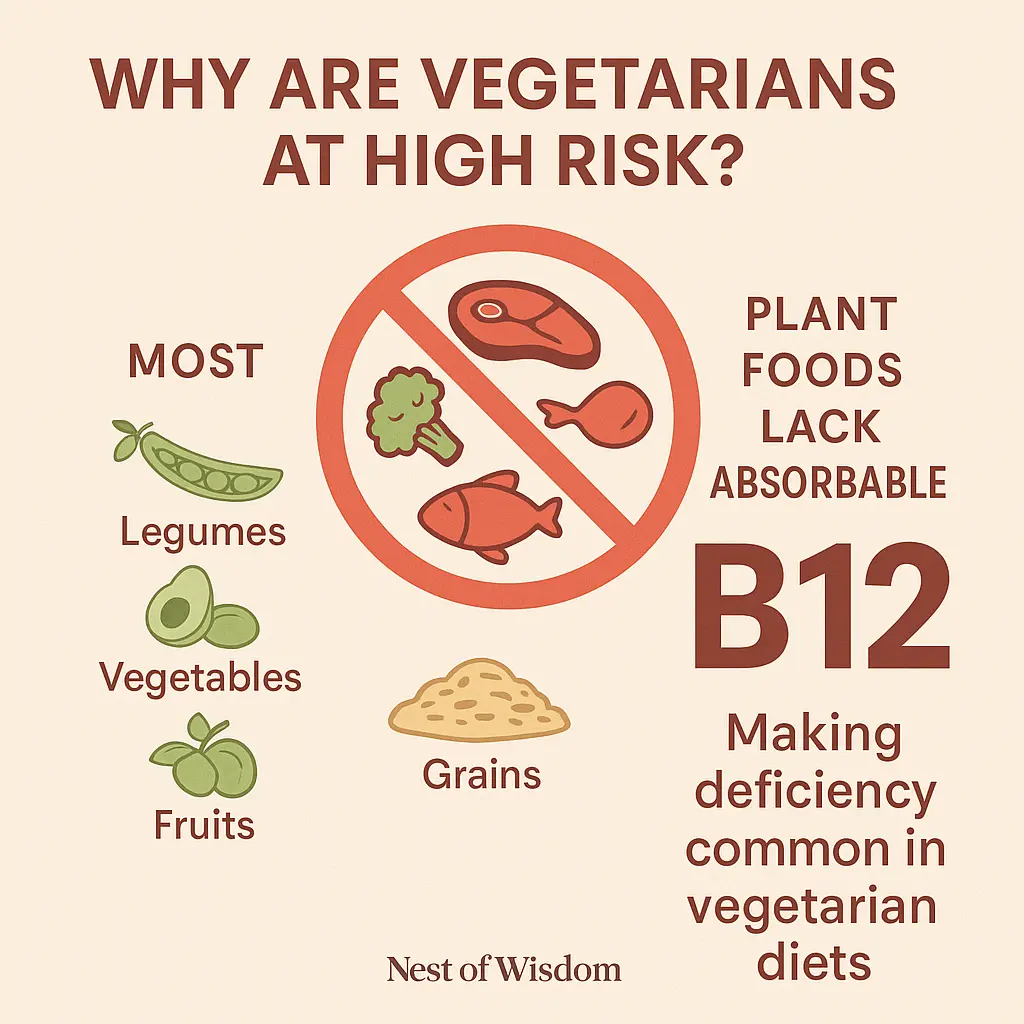

Risk increases with strict vegan diets, low-fortification regions, digestive disorders, frequent antacid use, metformin therapy, and age-related absorption changes. Seniors and pregnant/lactating women require special attention to prevent Vitamin B12 Deficiency in Vegetarians.
🕵️♀️ Hidden Risk Factors That Worsen Deficiency
- Low stomach acid (achlorhydria): common in older adults; impairs B12 release from food.
- Medications: Metformin, PPIs, and H2 blockers may reduce absorption—review regularly with your clinician.
- Pernicious anemia: autoimmune; reduces intrinsic factor needed for B12 absorption.
- GI disorders/surgeries: Celiac, Crohn’s, IBS overlaps, or bariatric procedures can impair uptake.
- Alcohol excess & poor diet quality: both worsen Vitamin B12 Deficiency in Vegetarians.
🧠 Symptoms: Early vs Later Signs
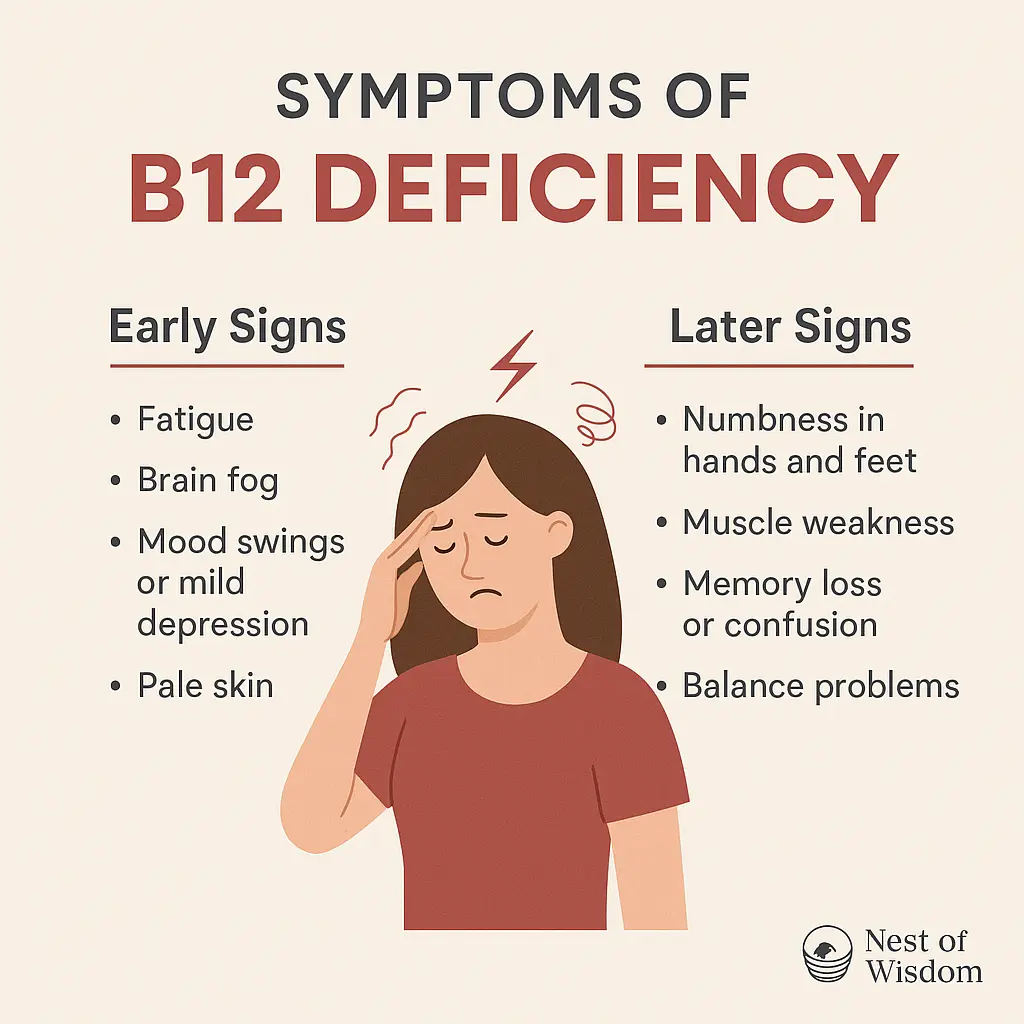

Early Signs
- Persistent fatigue, low stamina
- Brain fog, poor concentration
- Low mood or irritability
- Pale skin, palpitations
Later Signs
- Numbness/tingling in hands and feet
- Balance problems or muscle weakness
- Memory lapses or confusion
- Glossitis (sore, red tongue) and walking instability
Note: Neurological symptoms may become long-lasting if Vitamin B12 Deficiency in Vegetarians persists—address early.
தமிழில்: “தினமும் தூக்கமும் மனச்சோர்வும், மறதி, கைகளில் ஊசி குத்துவது போல உணர்வு—இவை எல்லாம் B12 குறைபாட்டின் அறிகுறிகள். ஆரம்பத்திலேயே கவனித்தால் தீர்வு எளிது.”
🧪 Busted Myths about Vegetarian B12
Myth 1: “Spinach contains B12.”
False. Leafy greens are great for folate—not active B12.
Myth 2: “Curd and idli/dosa batter cover B12.”
Fermented foods support gut health but don’t reliably supply active B12 for preventing Vitamin B12 Deficiency in Vegetarians.
Myth 3: “Seaweed or tulsi water provides enough B12.”
Seaweeds may contain B12 analogs that are not consistently active in humans; tulsi water is beneficial spiritually, not a B12 source.
Myth 4: “If my serum B12 is ‘normal’, I’m fine.”
Some symptomatic people have borderline serum B12; functional markers (MMA, homocysteine) can still show deficiency.
Myth 5: “A regular multivitamin is enough.”
Not always. Many multis provide insufficient B12 to correct active Vitamin B12 Deficiency in Vegetarians.
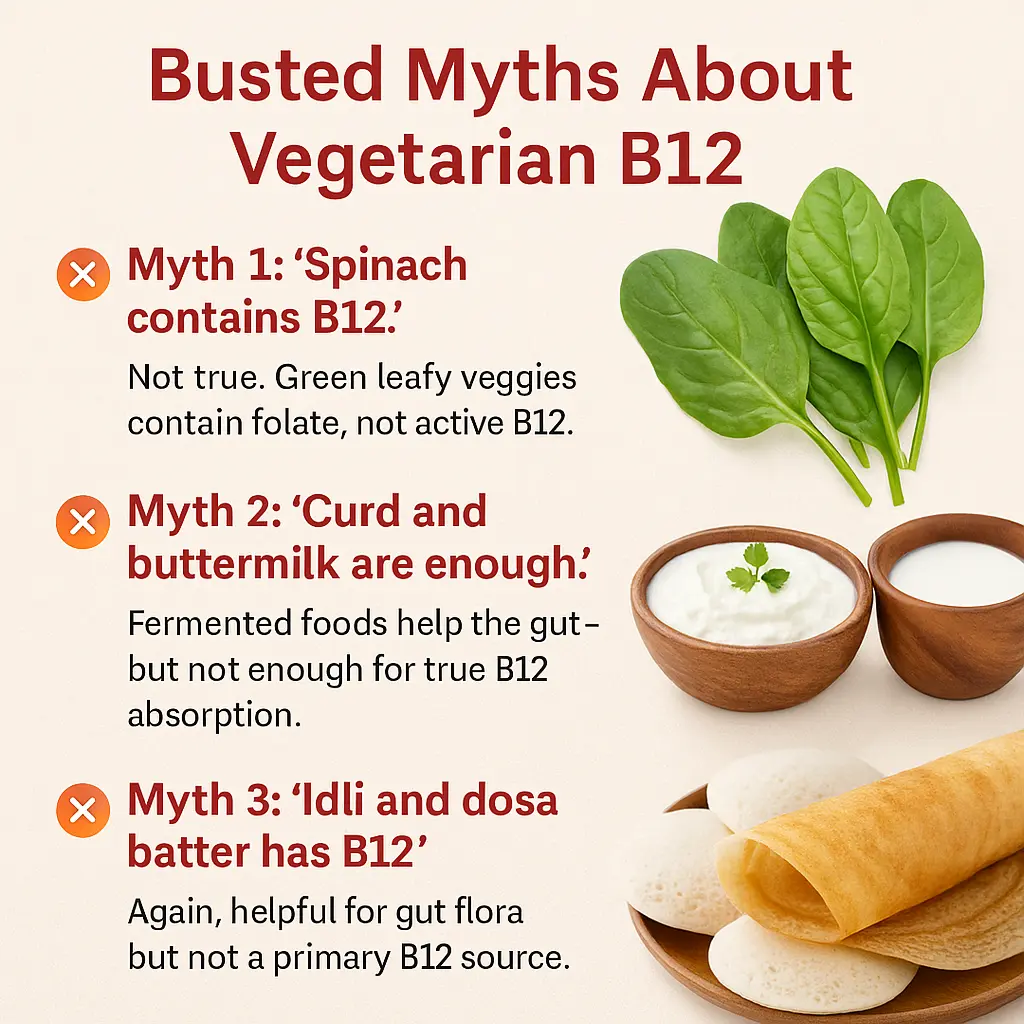

🔬 How to Test Correctly (B12, MMA, Homocysteine)
Work with a qualified clinician. A basic screen is a good start, and functional tests confirm borderline cases of Vitamin B12 Deficiency in Vegetarians.
- Serum Vitamin B12: Often considered low when < 300 pg/mL; 300–400 pg/mL may be borderline for some people.
- MMA (Methylmalonic Acid): Elevated MMA strongly suggests cellular B12 deficiency—even if serum B12 looks “okay.”
- Homocysteine: Elevated levels can reflect B12/folate/B6 issues; interpret with your doctor.
Tip: If symptoms persist despite “normal” serum B12, ask about MMA and homocysteine. Also review medications (metformin, PPIs/antacids) and gut health factors.
🌿 Natural Ways to Fix Vitamin B12 Deficiency in Vegetarians
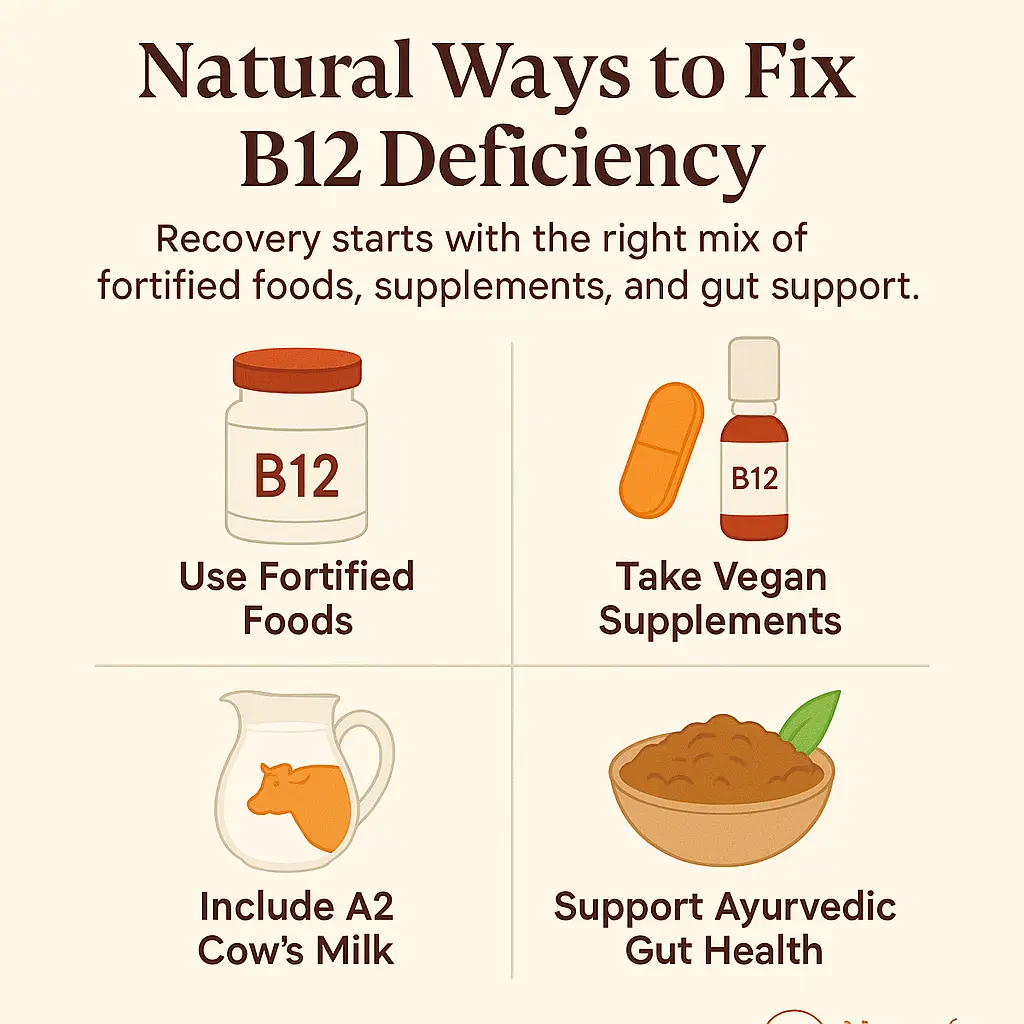

1) Use Fortified Foods Weekly
Reliable vegetarian sources are fortified foods—look for “cyanocobalamin” or “methylcobalamin” on labels to actively address Vitamin B12 Deficiency in Vegetarians.
- Nutritional yeast (B12-fortified)
- Fortified plant milks (soy, almond, oat)
- Fortified breakfast cereals
- Fortified tofu or meat-alternatives
Label goal: Aim for products that deliver ~100% Daily Value per serving. Spread servings through the week for steady intake.
2) Take a Vegan B12 Supplement (as Advised by Your Clinician)
Common practical patterns (confirm with your doctor):
- Daily low-dose: ~250–500 mcg per day, or
- Intermittent higher dose: ~1,000 mcg 2–3× per week
Forms: Cyanocobalamin is stable and widely used; methylcobalamin is also popular. Sublingual tablets or sprays can be convenient. If Vitamin B12 Deficiency in Vegetarians is severe or due to malabsorption, injections may be recommended.
3) If Lacto-Vegetarian: Include Dairy Thoughtfully
Milk and curd provide modest B12. Use fresh, minimally processed dairy if it suits your health and ethics. Don’t rely on it alone to correct Vitamin B12 Deficiency in Vegetarians—combine with fortified foods and/or supplements.
4) Support Gut Health & Absorption
Even with good intake, poor absorption can block progress. Helpful habits:
- Maintain healthy stomach acid (overuse of antacids/PPIs can reduce absorption—discuss with your doctor).
- Regular fiber, fermented foods (curd, buttermilk where appropriate), and diverse plants for microbiome support.
- Ayurvedic commonsense: gentle triphala at night (if suitable), warm water on waking, mindful meal timing.
தமிழில்: “உணவின் செரிமானம் சரியாக இருந்தால் தான் B12 உடலில் சரியாக பயன்படுத்தப்படும். குடல் நலன் முக்கியம்.”
5) Combine B12 with “Co-Factors” in Your Diet
Ensure adequate folate (greens, legumes), vitamin B6 (bananas, potatoes, pulses), and iron (lentils, beans, jaggery, greens). These nutrients work in related pathways and help you feel the benefits faster when correcting Vitamin B12 Deficiency in Vegetarians.
🍽️ 1-Day B12-Smart Vegetarian Meal Plan
- Breakfast: Fortified soy milk smoothie (banana + oats) + 1 tbsp fortified nutritional yeast sprinkled on avocado toast.
- Lunch: Lemon rice with peas + curd (if lacto-vegetarian) + mixed salad (greens, sprouts, carrots).
- Snack: Roasted chana + tender coconut water.
- Dinner: Multigrain chapati + palak dal + cabbage poriyal; finish with warm water.
- Supplement: Take your clinician-recommended B12 (daily or 2–3×/week).
Hydration & movement: Sip water through the day and add a 20–30 minute walk for better appetite regulation and mood. This routine pairs well with fixing Vitamin B12 Deficiency in Vegetarians.
🌿 Real-Life Case Study (Vegetarian Adult)
R., a 34-year-old vegetarian marketing professional, reported afternoon crashes, brain fog, and tingling in the feet. Serum B12 was borderline “normal,” yet symptoms persisted—classic for Vitamin B12 Deficiency in Vegetarians. Her clinician added MMA testing, which was elevated. Plan: fortified foods 4×/week, 1,000 mcg methylcobalamin sublingual 3×/week for 8 weeks, and a simple gut-support routine (curd with jeera at lunch, warm water AM, cut down antacids). Within 4–6 weeks, energy improved and tingling reduced. At 12 weeks, cognitive clarity and stamina returned to baseline; maintenance dose reduced per clinician advice.
⏳ What Happens if Deficiency Is Ignored?
- Neurological: persistent numbness/tingling, gait instability, and cognitive issues may become long-lasting.
- Hematologic: megaloblastic anemia causing breathlessness, palpitations, severe fatigue.
- Cardiometabolic: elevated homocysteine is associated with cardiovascular risk.
- Mood & mental health: anxiety, low mood, and poor focus can intensify when Vitamin B12 Deficiency in Vegetarians remains uncorrected.
- Pregnancy & infants: deficiency raises concerns for fetal/infant neurodevelopment—requires medical guidance.
Take symptoms seriously. Early action makes reversing Vitamin B12 Deficiency in Vegetarians faster and protects long-term nerve health.
🧭 Lifestyle & Prevention Tips
- Review medications with your clinician (metformin, PPIs, H2 blockers).
- Plan weekly fortified staples; never run out.
- Set recurring reminders for supplements; pair with breakfast or post-dinner walk.
- Don’t over-boil milk at very high heat for long periods.
- Keep a simple tracker: energy (1–10), mood (1–10), tingling (Y/N), and weekly servings—helps monitor Vitamin B12 Deficiency in Vegetarians progress.
- Pair nutrition with sleep, sunlight, and a daily 20–30 min walk for metabolic clarity.
தமிழில்: “சிறிய சிறிய பழக்கங்கள்—நேரம்守 பின்பற்றல், சீரான உணவு, ப்ரோபயாட்டிக் பழக்கங்கள்—நீண்டகாலத்தில் பெரிய பலனை தரும்.”
❓ FAQs
Q1. Can I reverse Vitamin B12 Deficiency in Vegetarians naturally?
A1. In many cases, yes—by combining fortified foods, appropriate B12 supplements, and gut-friendly habits. Severe deficiency or neurological signs need medical supervision.
Q2. Are plant sources reliable for B12?
A2. Not without fortification. Seaweeds and some fermented foods may contain analogs that are not consistently active in humans.
Q3. How long until I feel better?
A3. Energy and mood can improve within 2–6 weeks once intake/absorption are fixed; nerve symptoms may take longer. Follow your clinician’s timeline for Vitamin B12 Deficiency in Vegetarians.
Q4. Is a multivitamin enough?
A4. Not always. Check the B12 amount and form; many multivitamins provide insufficient doses for correcting active deficiency.
Q5. Can children or pregnant women take B12?
A5. Yes, but dosing must be age-/stage-appropriate. Always follow pediatric/obstetric guidance.
Q6. What if my serum B12 is “normal” but I still have symptoms?
A6. Ask about MMA and homocysteine testing; review medications and gut factors with your clinician.
Q7. Can Vitamin B12 Deficiency in Vegetarians cause hair loss?
A7. Low B12 may contribute to hair shedding in some people; address overall nutrition, iron, folate, and thyroid status too.
Q8. Which is better: methylcobalamin or cyanocobalamin?
A8. Both can work. Choose what you tolerate and will take consistently; discuss with your clinician, especially if malabsorption is suspected.
Q9. Do I need B12 injections?
A9. Only if you have significant deficiency with malabsorption/pernicious anemia, or per doctor’s advice. Many cases of Vitamin B12 Deficiency in Vegetarians respond to oral/sublingual plans.
Q10. Can I be vegetarian lifelong without B12 problems?
A10. Yes—if you consistently use fortified foods and/or appropriate supplements, monitor symptoms, and test when needed.
🔗 Helpful Internal & External Links
- 7 Daily Habits for Better Sleep
- Grow Organic Vegetables at Home
- Top 10 Sacred Plants for Vastu
- Low GI South Indian Meals
- Best Decluttering Tips to Simplify Life
- NIH Office of Dietary Supplements – Vitamin B12 (Consumer)
- The Vegan Society – Vitamin B12
- Johns Hopkins Medicine – Intermittent Fasting: What is it & how does it work?
Medical Disclaimer: This article is educational and does not replace personalized medical advice. Always consult a qualified healthcare professional for testing, diagnosis, and treatment.
Nest of Wisdom Insights is a dedicated editorial team focused on sharing timeless wisdom, natural healing remedies, spiritual practices, and practical life strategies. Our mission is to empower readers with trustworthy, well-researched guidance rooted in both Tamil culture and modern science.
இயற்கை வாழ்வு மற்றும் ஆன்மிகம் சார்ந்த அறிவு அனைவருக்கும் பயனளிக்க வேண்டும் என்பதே எங்கள் நோக்கம்.
- Nest of Wisdom Authorhttps://nestofwisdom.com/author/varakulangmail-com/
- Nest of Wisdom Authorhttps://nestofwisdom.com/author/varakulangmail-com/
- Nest of Wisdom Authorhttps://nestofwisdom.com/author/varakulangmail-com/
- Nest of Wisdom Authorhttps://nestofwisdom.com/author/varakulangmail-com/
Related posts
Today's pick
Recent Posts
- Internal Linking Strategy for Blogs: A Practical, Human-Centered Playbook
- AI in the Automotive Industry: A Practical, Human-Centered Guide
- Cloud Tools for Small Businesses and Freelancers: The Complete Guide
- Generative AI in Business: Real-World Use Cases, Benefits & Risks
- 7 Life-Changing Daily Habits for Weight Loss Without Dieting

